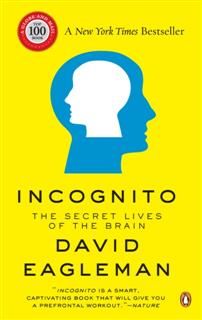Incognito
- Vasily Betinje citiraoпре 8 година“There’s someone in my head, but it’s not me.”
- Olga Krutskoje citiralaпре 4 годинеOur brains run mostly on autopilot, and the conscious mind has little access to the giant and mysterious factory that runs below it.
- Olga Krutskoje citiralaпре 4 годинеThe first thing we learn from studying our own circuitry is a simple lesson: most of what we do and think and feel is not under our conscious control. The vast jungles of neurons operate their own programs.
- Kelvin Tjiawije citiraoпре 5 годинаTo help a citizen reintegrate into society, the ethical goal is to change him as little as possible to allow his behavior to come into line with society’s needs. Our proposal springboards off the knowledge that the brain is a team of rivals, a competition among different neural populations. Because it’s a competition, this means the outcome can be tipped.
- Kelvin Tjiawije citiraoпре 5 годинаAs the neuroscientist Wolf Singer recently suggested: even when we cannot measure what is wrong with a criminal’s brain, we can fairly safely assume that something is wrong.
- Kelvin Tjiawije citiraoпре 5 годинаThe principle states that the answer to the free-will question simply does not matter. Even if free will is conclusively proven to exist one hundred years from now, it will not change the fact that human behavior largely operates almost without regard to volition’s invisible hand.
- Kelvin Tjiawije citiraoпре 5 годинаMan is a masterpiece of creation, if only because no amount of determinism can prevent him from believing that he acts as a free being.
- Kelvin Tjiawije citiraoпре 5 годинаParkinson’s results from the loss of cells in the brain that produce a neurotransmitter known as dopamine. The treatment for Parkinson’s is to increase the patients’ dopamine levels—usually by increasing the body’s production of the chemical, and sometimes by using medications that directly bind to dopamine receptors. But it turns out that dopamine is a chemical on double duty in the brain. Along with its role in motor commands, it also serves as the main messenger in the reward systems, guiding a person toward food, drink, mates, and all things useful for survival. Because of its role in the reward system, imbalances in dopamine can trigger gambling, overeating, and drug addiction—behaviors that result from a reward system gone awry
- Kelvin Tjiawije citiraoпре 5 годинаBy the late 1800s, researchers had discovered that damage to the amygdala caused emotional and social disturbances.3 In the 1930s, biologists Heinrich Klüver and Paul Bucy demonstrated that damage to the amygdala in monkeys led to a constellation of symptoms including lack of fear, blunting of emotion, and overreaction.4 Female monkeys with amygdala damage showed inappropriate maternal behavior, often neglecting or physically abusing their infants.5 In normal humans, activity in the amygdala increases when people are shown threatening faces, are put into frightening situations, or experience social phobias.
- Kelvin Tjiawije citiraoпре 5 годинаuseful index of consciousness is the capacity to successfully mediate conflicting zombie systems. The more an animal looks like a jumble of hardwired input–output subroutines, the less it gives evidence of consciousness; the more it can coordinate, delay gratification, and learn new programs, the more conscious it may be. If this view is correct, in the future a battery of tests might be able to yield a rough measure of a species’ degree of consciousness.
fb2epub
Prevucite i otpustite datoteke
(ne više od 5 odjednom)


